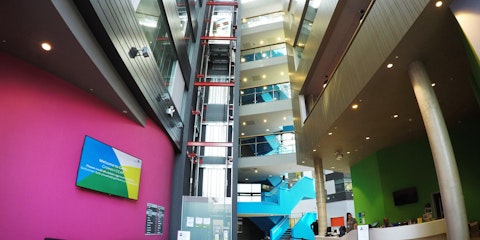Physics - A2
About this course
The Physics A2 programme follows on from AS Physics and should be taken in conjunction with two or three other subjects and the Welsh Baccalaureate.
Based at our City Centre campus in Cardiff, learners may be able to take this qualification as a part-time student.
A qualification in Physics can lead to a higher education course in Physics, Engineering or other science/technology related subjects, or to employment where knowledge of Physics would be useful.
What you will study
A2 Physics covers the following units:
Unit 3: Oscillations and Nuclei (written exam 2hrs 15m - 25% of qualification)
This unit includes the following topics:
- Circular motion
- Vibrations
- Kinetic theory
- Thermal physics
- Nuclear decay
- Nuclear energy
The exam will be divided into two sections:
Section A: 80 marks - a mix of short answer and extended answer questions with some set in a practical context.
Section B: 20 marks - one comprehension question.
Unit 4: Fields and Options (written exam 2hrs - 25% of qualification)
Section A: 80 marks - a mix of short answer and extended answer questions with some set in a practical context. This unit includes the following topics:
- Capacitance
- Electrostatic and gravitational fields of force
- Orbits and the wider universe
- Magnetic fields
- Electromagnetic induction
Section B: 20 marks - choice of 1 out of 4 options: Alternating Currents, Medical Physics, The Physics of Sports, Energy and the Environment.
A2 Unit 5: Practical examination (10% of qualification)
This unit comprises of two tasks:
Experimental Task (25 marks)
Practical Analysis Task (25 marks)
Note that the remaining 40% of the available marks would have been carried forward from AS Physics.
Entry requirements
Successful completion of AS programme including satisfactory attendance and tutor recommendation.
Teaching and assessment
Two written exams and practical assessments
Important points
- The College welcomes contact with parents/guardians of students who are under 18.
- Additional support is available for students with learning difficulties and disabilities.
- Cardiff and Vale College is committed to inclusion and values diversity. We are determined to promote equality of opportunity and to treat everyone fairly and with respect.
- Cardiff and Vale College reserves the right to make changes to this course without prior notice.
- Course fees are subject to change. Your fee will be confirmed prior to enrolment.
- All courses are accurate at the time of upload or print.
- Courses can only run if there are sufficient numbers.
- Please note, if you choose three or more course choices, then you may be referred for a careers appointment first. This does not apply to A Level or GCSE choices.
Start date
End date
Time of day
Full Time
Course code
Qualification


Facilities
More...
CAVC is a great place to study A Levels – the teachers, the support, the facilities and social experience has been so good – I’m delighted to have gained all A’s in my AS exams. The support to apply and prepare for university is brilliant and I’m looking forward to progressing after college.
Career prospects & further study
500
On completion of the A Level programme, the majority of our students progress onto universities across the country and beyond. Based on this course, there are many options but below are just a few examples of degree programmes you could go on to study at University:
- Construction and Built Environment
- Computer Science
- Electrical Engineering
- Engineering
- Information Technology
- Mechanical Engineering





